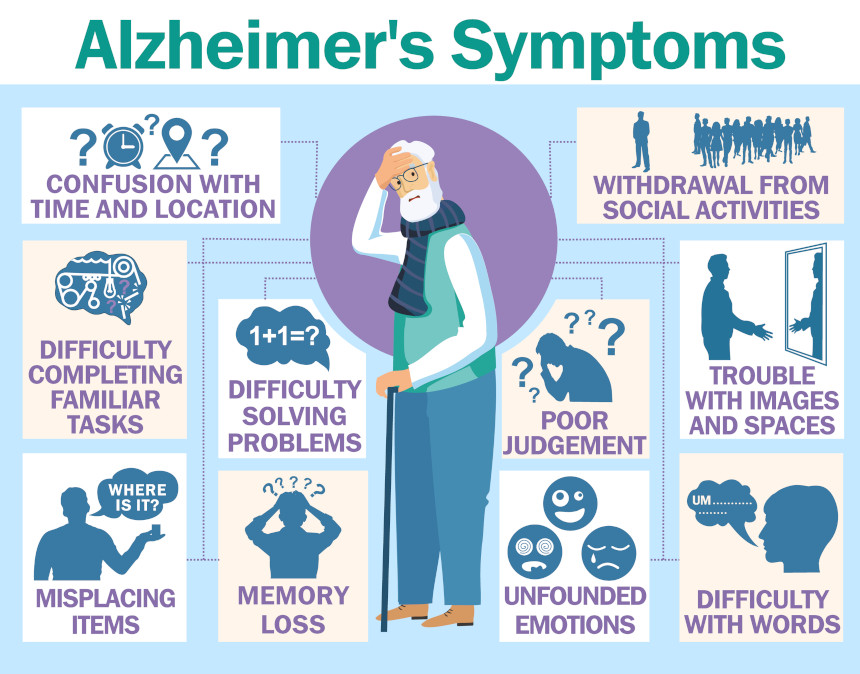World Alzheimer’s Month: The Mind of the Matter
Every September, Alzheimer’s Disease International mounts the World Alzheimer’s Month campaign. For the last eight years, the group has aimed to generate awareness surrounding dementia while dispelling misconceptions and misinformation. The official World Alzheimer’s Day comes later in the month, on September 21. ADI serves as the connection tissue for more than 100 other organizations across the world while teaming with corporate partners and consulting with WHO, the World Health Organization. In the spirit of the month, here are five things from ADI that you and your loved ones need to remember.
1. Dementia Isn’t Just One Thing

Medical professionals identify more than 100 specific kinds of dementia. While Alzheimer’s is associated with up to 60 percent of all cases, other frequently noted types include dementia with Lewy bodies, fronto-temporal dementia, and vascular dementia. Generally, various kinds of dementia have some symptoms in common. The most well-known is memory loss. Some patients struggle with routine conversational comprehension, or with finding the word that they wanted to use while speaking. A person may also have issues with conducting a familiar task, like forgetting how to operate a frequently used device. Also, people coping with dementia may experience changes in their overall mood or personality.
2. It’s a Worldwide Problem
According to ADI, around 50 million people are dealing with dementia around the globe right now. A new case appears every three seconds. Also, dementia is not just limited to the elderly. Symptomatic persons under the age of 65 are categorized as young or early onset dementia. As a personal aside, my mother-in-law was diagnosed with early onset at the age of 55.
3. It’s Not Necessarily Hereditary

A common fear among the children of Alzheimer’s patients is the notion of the disease being hereditary. It can run in families, but the occurrences are rare. When these instances do happen, it’s typically tied to an inherited genetic mutation that tends to be associated with early onset cases. When that mutation is present, the possibility of siblings or offspring developing the disease is actually one in two. In families where the Alzheimer’s is present later in life (over 65), close relatives still have a chance to develop dementia that’s three times greater than someone without the disease present in their family.
4. There’s No Cure … For Now
While a variety of drugs, treatments, and therapies are used to counteract the effects of dementia, there is presently no overall cure. Progression can be slowed up to 18 months with the right treatment, while medications exist that treat specific symptoms. Caregivers, both familial and professional, became a major component of support as the dementia progresses. The Alzheimer’s Association lists a number of treatment options that cover sleep disruption, behavior, and memory loss, but there is no cure as such at the moment. In an article from last year, The Mayo Clinic detailed some of the new therapies and approaches that are being explored by researchers, including studies of how vascular issues can be associated with dementia and the development of medication to fight the plaques that hamper brain function.
5. How You Live Now Helps You Later

There’s no silver bullet that prevents anyone from developing Alzheimer’s. However, there are baseline recommendations that anyone can follow that can help stave off the development of dementia. Research has shown that general fitness helps, which starts with healthy eating. Studies have shown that physical activity is a benefit; even if you don’t work out regularly, going for walks and spending time in active situations improves your health measurably over spending every day in sedentary way. Mental activity is important; reading regularly is a huge benefit, as is engaging in mentally stimulating activities like doing puzzles (of both the boxed and book-based variety), writing, or playing games of the kind found at sites like Lumosity. Regular social interaction, even if done via phone, Zoom, etc. is also shown to have positive results in terms of brain activity.
Featured image: awsome design studio / Shutterstock
New Hope for an Alzheimer’s Cure
An interview with Dr. William Thies, chief medical and scientific officer for the Alzheimer’s Association.
In the spring of 2011, the National Institute on Aging and the Alzheimer’s Association announced a new pre-clinical stage of Alzheimer’s Disease, marking the first change in the definition of the illness in 27 years. The announcement grows out of evidence that plaques and tangles characteristic of Alzheimer’s Disease begin to form in the brain years before the patient shows any symptoms. The new definition raises the tantalizing possibility of developing treatments that could delay or halt the progression of the illness before the brain is compromised. BeClose.com spoke with Dr. William Thies, chief medical and scientific officer for the Alzheimer’s Association, about the impact of this new definition both today and in the future.
Q: If there are no symptoms, why is it important to identify this very early phase of Alzheimer’s?
A: There is the feeling in the field that by the time someone has become demented, it’s too late to treat them. What we’re beginning to see is the evolution of a picture that is a lot like that of other diseases with a long onset. For example, at one time, people defined heart attack as the event that happened when the coronary artery was blocked. But the real success in treatment came when it was realized that the pathology for heart attack appeared many years before a heart attack occurred. We now know that if you treat the sclerosis that underlies the problem, you can prevent a heart attack from ever occurring.
Q: Can you get tested for pre-clinical Alzheimer’s at this point?
A: No, you can’t go to your local doc and say, I’d like to get this particular cerebro-spinal fluid test; it’s just not commercially available. That said, it may be possible that amyloid imaging, which is a way of using a PET scanner to take a picture of the amount of beta amyloid in an individual’s brain, will become publicly available in a relatively short period of time. A few months maybe. However, for consumers, there’s no point in doing the testing unless there are good treatment options.
Q: What are some of the most promising avenues of research into future treatments?
A: Many of the therapies being tested have the potential to limit the accumulation of beta amyloid. This is a polypeptide chain that exists naturally in the brain, but develops two extra amino acids as some people age. This substance starts to accumulate in the brain. We know from experiments that beta amyloid is toxic to brain cells. Many feel that if you could limit that accumulation of toxin, you could limit the course of Alzheimer’s Disease.
Q: How would a potential drug work?
A: You can either get the brain to make less amyloid or get rid of more. It’s not exactly rocket science. Two drugs are currently being tested at phase III level—these are the big trials necessary to get permission from the FDA to sell the drug. Being in phase III doesn’t mean that the drug is effective. Still, we can at least imagine a time when they might be available in your medicine cabinet. So that’s one promising area.
Q: Any others?
A: Some data says that if you drink more red wine you tend to have less Alzheimer’s Disease disease, so that track of epidemiological information has led us to resveratrol, an antioxidant found in grape skins. There’s also a blood product called IVIG (intravenous immunoglobin), which is being tested at phase III level. All of those are promising.
Q: But all this is far off. Without a cure, what’s the benefit of knowing you have this devastating illness in your future?
A: The Alzheimer’s Association has encouraged early diagnosis for years, not so much for the medical care you can receive, but rather for your ability to learn about the disease and prepare for the future. If you have a goal to travel around the world, for example, and if we have an effective biomarker that could let you know years in advance, you might want to take that trip a bit sooner while you’re still able. You’d certainly want to create powers of attorney so that your healthcare and estate planning would be handled as you wish.
Q: What about the impact for family members and potential caregivers?
A: It’s a chance for education. One of the things people don’t recognize is that people in early stage dementia get victimized by society. For example, they don’t remember they just bought a new car, so they go out and buy another one. Family members can help protect them from harm. Another benefit is understanding that Alzheimer’s changes peoples’ personality. This can be devastating to family members who mistakenly believe that mom or dad, in expressing hostility or anger, is revealing true opinions they’d been hiding for years. So the value of an early diagnosis will be able to stand on its own even with the limits of what we know today. And certainly knowing that better medications are coming, it takes on an even greater purpose.
–Steven Slon
Steven Slon is the Editorial Director for The Saturday Evening Post. He writes a regular column about aging and caregiving for http://www.BeClose.com, in which this article first appeared.